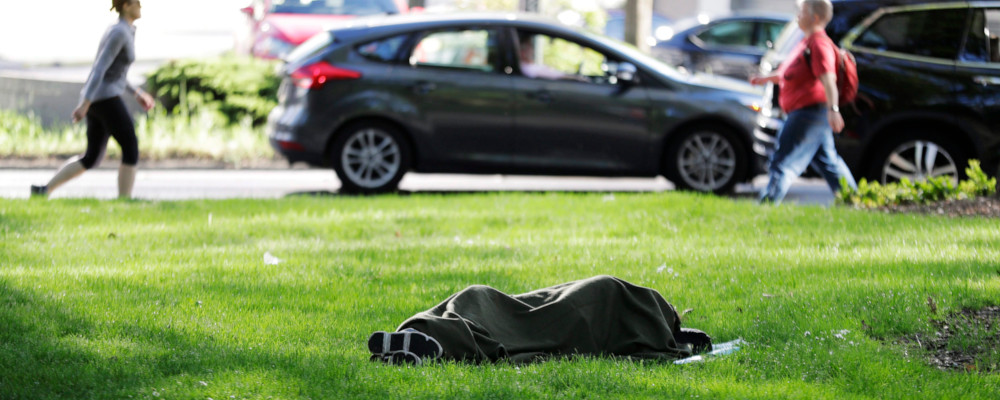This past summer, the City of Toronto made the right decision to move the homeless out of city parks. It was good for the homeless, those who use the parks, and the city. Otherwise, Toronto was going down the same disastrous route as big West Coast American cities such as San Francisco, Los Angeles, and Seattle.
When the police and city workers moved in to clear the parks, hundreds of protesters showed up trying to stop the police from clearing the encampments. There was also a smattering of support throughout the city with signs of “We welcome our homeless neighbours in parks.”
Why would these poverty advocates and progressives want to keep the homeless—many with mental health and drug addictions problems—living in substandard conditions? These makeshift camps were dirty, unsafe, and littered with trash and discarded needles. It’s not as if the homeless were abandoned; most were taken to shelters or hotels throughout the city. Yet protesters insisted that squatters be allowed to live rough in public parks.
There are two possible answers; the first has to do with the political use of the poor for PR reasons. This is sometimes called the Principal-Agent problem, where the agent works against the principal’s interests, in this case, the poor. Agents, or advocates, need the homeless living in tents as a constant reminder to society of the failure of an elite political and economic system that keeps part of the population in abject poverty.
Cynical? Yes, but let’s not underestimate the power these tent cities have on the emotional appeal to the public.
Second, progressives see the world as a complex relationship where the powerful oppress those without. This comes directly from the playbook of post-modern thinking about mental illness and crime as “social constructs.”
Eliminate mental illness as a medical condition, and the homeless are just victims of society. Such thinking has had a powerful effect on modern psychiatric thinking over the past few decades. Deinstitutionalization is now considered a marginal success at best; 75 percent of homeless women suffer from some form of mental illness.
As far as crime is concerned, extremists on the left advocate radical reform to the point of abolishing all forms of punishment. The underlying foundation for the defund-the-police movement is based on the premise that crime is just another way of “getting by” for a segment of society.
Travelling down that road will surely lead to more homelessness and crime.
In Seattle, 51 percent of the homeless migrated from other cities.
A recent article by Christopher Rufo for the Manhattan Institute suggests a reason why. Rufo outlines how the left and right think differently about the homeless by turning to the insights of American social psychologist Jonathan Haidt. Haidt argues that progressives and liberals, in the modern sense of that word, have an optimistic view of human nature and are more concerned with care, fairness, and the belief that the homeless are victims of circumstances. On the other hand, conservatives value compassion, respect, cleanliness, obeying the law, self-control, and the obligations of individuals to their community or group. The right also has a more sober view of human nature.
Rufo puts both of these attitudes to the test as to which makes better public policy.
Contrary to perceived wisdom and media coverage, homelessness in the United States has declined in 40 states from 2009 to 2019. However, homelessness has increased in California, Oregon and Washington, which account for a third of the U.S. homeless population. In the case of Los Angeles and Houston, two cities with comparable climate—as a factor in attracting the homeless—Houston has seen a steady decline in homelessness by 54 percent over the past decade, while increasing 24 percent in San Francisco, 15 percent in Los Angeles and 25 percent in Seattle.
Houston’s successful approach, called compassionate enforcement, was achieved not only with supportive social policies but with an emphasis on enforcing the law by forbidding minor crimes such as panhandling and windshield washers.
West Coast cities have moved in the opposite direction by allowing illegal camps to expand, encouraging drug injection sites, and decriminalizing theft under $950. Progressives also see law enforcement as the problem and not the solution. In Seattle, local politicians even opposed hosing down feces-covered sidewalks “because hoses supposedly have racist connotations.” Rufo’s article also states that homeless addicts are almost a hundred times more likely to commit crimes than the average citizen.
The homeless have been generally seen as a group immune to conventional economic incentives. We now know they act rationally by moving to cities and communities that provide readily available social services, have low levels of law enforcement, and tolerate petty crime. In Seattle, 51 percent of the homeless migrated from other cities.
Moving squatters to safer shelters is a start, but without a vigilant attitude, we know they’ll be back. The objective is to balance the provision of public service while maintaining public order. Canada’s major cities have a choice to make: follow the West Coast model or that of Houston. Given the results so far, the decision seems straightforward.
Recommended for You

‘If you build it, they will come’: Why development charges are Canada’s real housing constraint

‘Election fever?’: Hub Politics on if Canadians will be headed to the polls this spring

‘A constant bombardment’: MP Garnett Genuis on the problem of MAID coercion

Tale of two provinces: Alberta gains jobs as Ontario loses 67,000 positions




